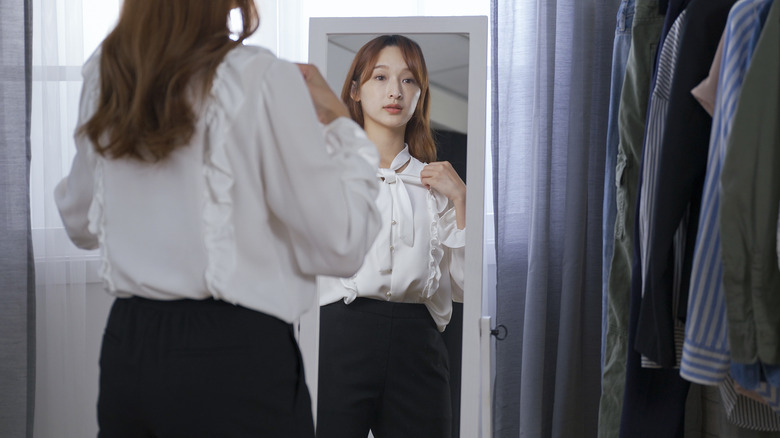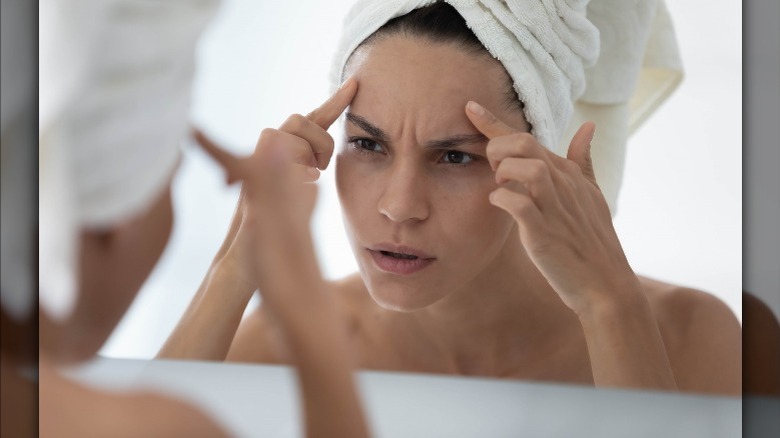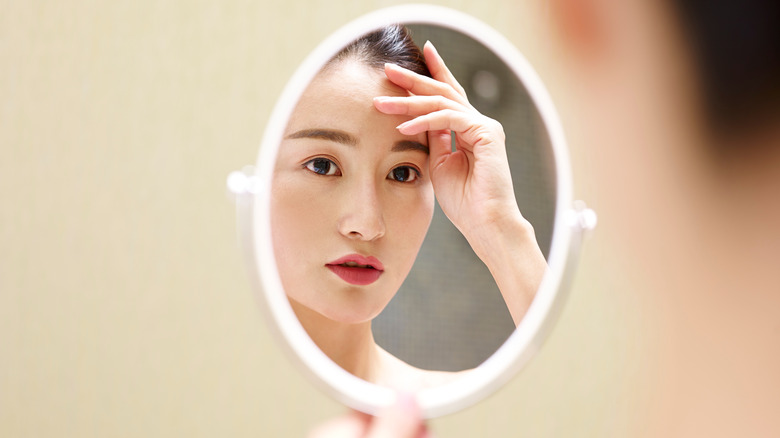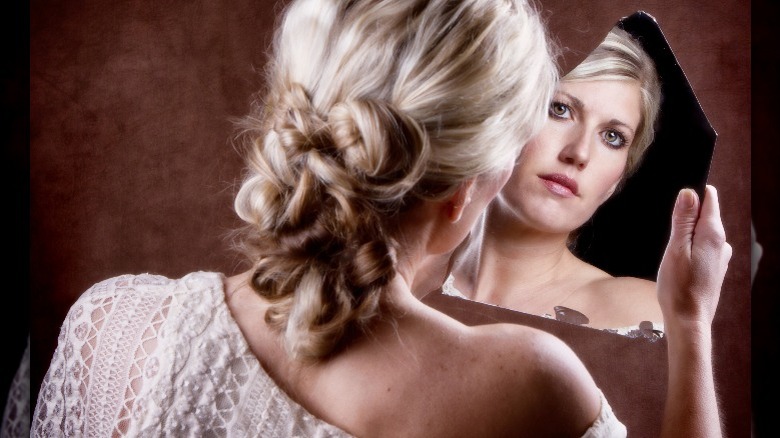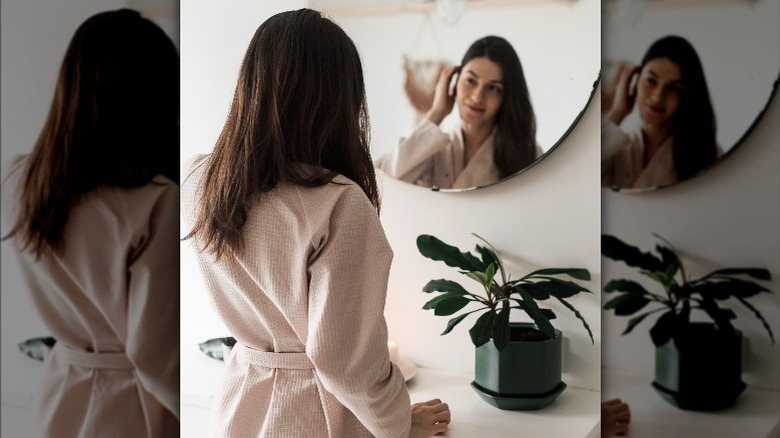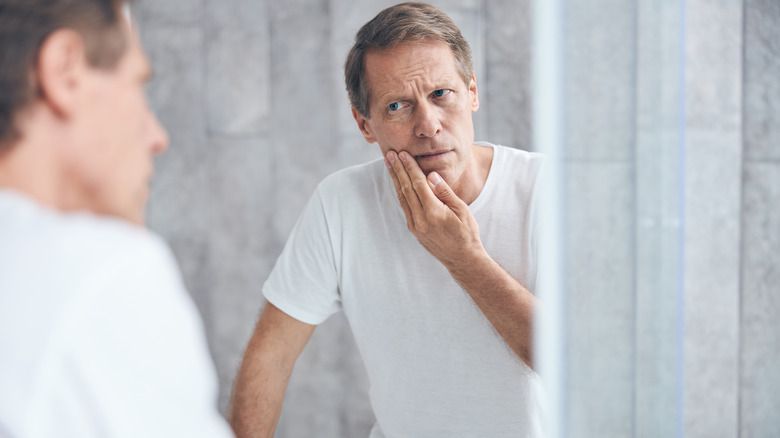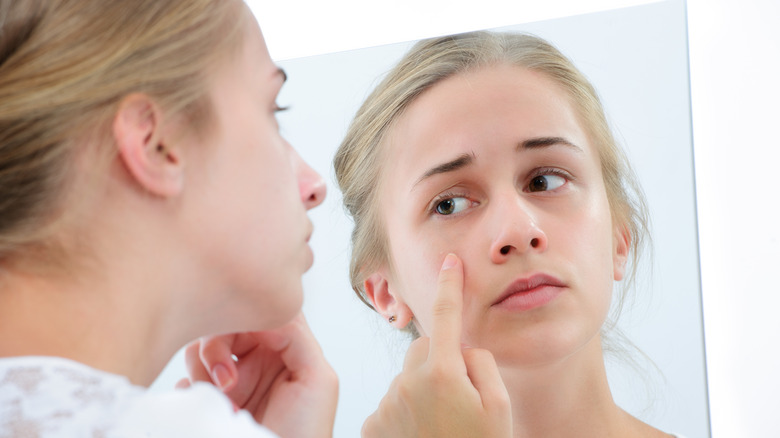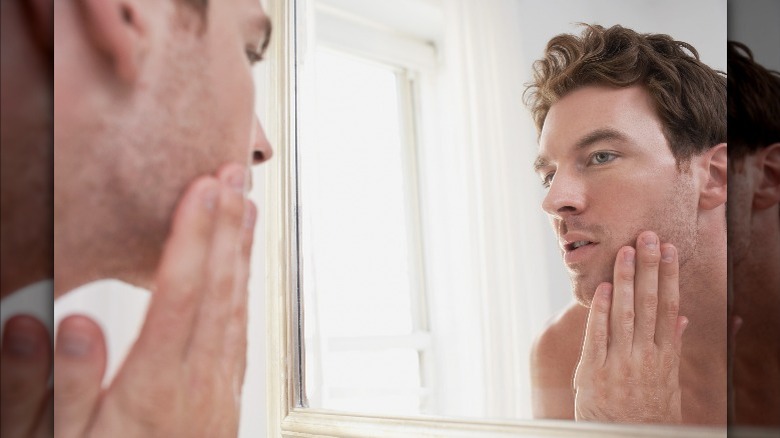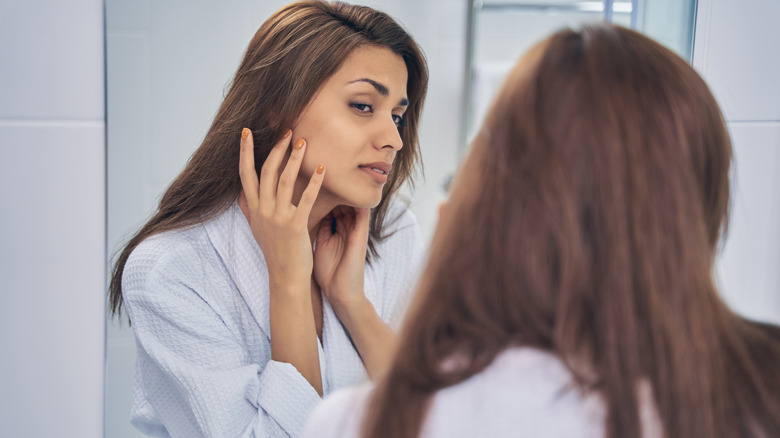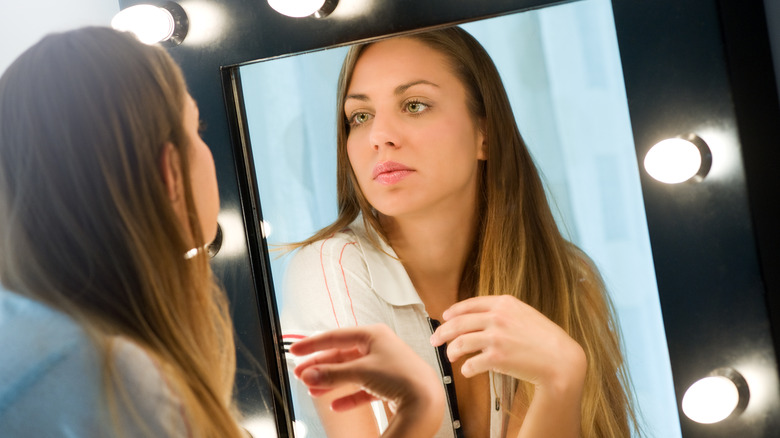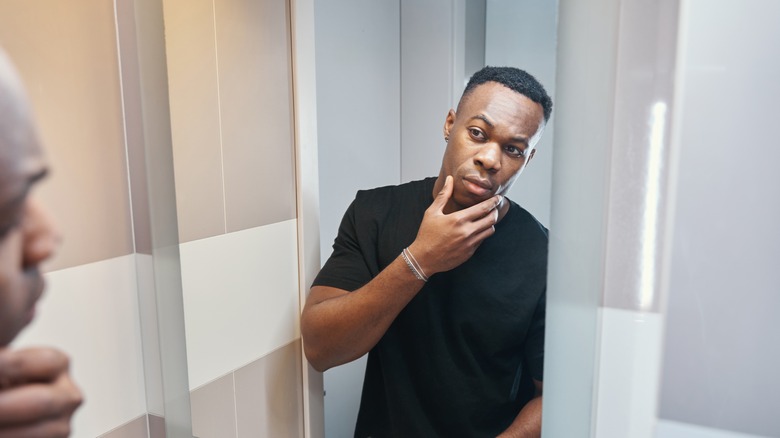What Happens To Your Body When You Stop Looking In The Mirror
For many of us, checking out our reflection in the mirror is a regular daily occurrence. We use mirrors when we brush our teeth, do our hair and makeup, and check out how our bodies look. Still, for some people, mirrors have become troublesome to the point of causing stress. The Daily Mail reported that staring in the mirror can eventually induce anxiety in even seemingly happy individuals. So what can we do to prevent our looks from stressing us out? According to Bustle, some bloggers, like Autumn Whitefield-Madrano, decided to experiment by doing a "mirror fast."
The concept is fairly straightforward: Pick a set amount of time (for example, one week) and then commit to not looking at your reflection during that period. While the outlet stated that some are skeptical of the benefits of going without a mirror, the experimenters — including Whitefield-Madrano and others, like Johanna Debiase — experienced positive results, including a stronger sense of self-awareness.
You might end up with a pretty great self-image
Even though most of us are used to staring at ourselves in mirrors at some point in the day, Goalcast stated that this seemingly simple part of our routines could negatively impact us. According to the outlet, self-image and self-esteem are largely connected to how we feel about the person staring back at us in the mirror. So, if you're unhappy with your appearance and constantly catching glimpses of yourself, you might be aiding a negative self-image without even realizing it. Likewise, the write-up added that people tend to focus on what they don't like about themselves.
Bustle stated that taking a break from staring in the mirror can break these judgmental thoughts and help you think of yourself in a more positive light. While this might not feel comfortable at first, letting go of the little things that deflate your self-image could cause you to become less self-conscious in the long run. Instead of worrying about how your clothes fit or how your skin or hair looks, you can focus on other, more positive things.
Avoiding the mirror could make you less critical
While it might seem like an obvious bonus, boosting your self-image can also lead to you being less critical of yourself, which can result in less negativity clouding your thoughts. According to WebMD, you could be influencing yourself with damaging feedback without even realizing it. And that negative self-talk isn't just hurting you in the moment; it can also impact how you interact with others. As certified life coach Franco Beneduce told WebMD, "Self-talk dictates how you relate to yourself and how you show up for other people." Instead of dwelling on perceived shortcomings, the outlet suggests trying to distance or distract yourself from the things that can feed your inner critic.
The Guardian reported that bloggers experimenting with mirror fasts found themselves becoming less critical. The aforementioned blogger Autumn Whitefield-Madrano (who wrote about her experience on her blog, The Beheld) stated that she wanted to take a break from mirrors to become less concerned about how her face looked. Her results were positive, and at the end of the experiment, the blogger felt a stronger sense of calm. She has now made mirror fasting an annual ritual.
Not looking in the mirror makes some people more self-aware
While it sounds like it would have the opposite effect, some people have reported that not looking in the mirror has helped them become more self-aware. In a write-up for Romper, Kimberly Zapata said that not looking in the mirror for a week helped her gain a better understanding of herself. She was pleasantly surprised that she gained more insight and became more self-aware, which helped her feel better about herself at the end of the day.
Elizabeth Kiefer, who wrote about her own mirror fasting experiment via Marie Claire, had an equally positive experience. Kiefer was reluctant to refrain from looking at a mirror for one week, and she'd put off the plan several times. But as the experiment progressed, the writer eventually had an epiphany during yoga class. In the class, Kiefer was surrounded by mirrors, and instead of focusing on her breathing and movements, she realized that she felt "trapped" and insecure about her appearance. The realization helped Kiefer understand that she was letting her fears about how she looked overshadow being able to enjoy the yoga class.
You might become less concerned about others' perception of you
Not looking in a mirror could also make you less self-conscious about how others perceive you. The aforementioned blogger Autumn Whitefield-Madrano stated in her HuffPost article that one of the benefits of her mirror fast was that she was less concerned about what other people thought of her. This realization came while she was creating a video diary for "The Today Show." While planning to film herself going to the beach during a mirror fasting period, the knowledge that millions of people would see her on national television didn't cause any anxiety.
While Whitefield-Madrano's experience was positive, Jezebel reported that not everyone was happy about the idea of avoiding their reflection. According to the outlet, broadcasting media wasn't too thrilled by the idea. For example, on a 2012 episode of "The Today Show," during which Whitefield-Madrano made an appearance, Savannah Guthrie questioned how the writer could do her makeup without a reflective guide. Likewise, NBC's then-chief medical editor Nancy Snyderman claimed that it's essential to know how one looks, declaring, "How we present ourselves opens up the doors for job interviews and dating." Still, with plenty of individuals happy with the experiment, some might think the mirror defenders are missing the point.
It could make you more conscious of how you use mirrors
While experimenting with any object, we are likely to become more aware of its nature and how we use it. In discussing the mirror fasting trend, Psychology Today reviewed both positive and unfavorable reactions, concluding that the mirror can play a complex role in a person's self-perception. The outlet declared that while superficial worries should hold less weight, appearance can be crucial for personal and professional matters. While mirror fasting might be interesting to try, the outlet said it's important to understand how to use mirrors and reflections in a healthy way.
Likewise, Bustle stated that while plenty of individuals think mirror fasting is helpful, many people think it's harmful. Some of these critics have even called the mirror fasting experiment narcissistic, claiming that avoiding all mirrors only reaffirms the idea that appearance matters. In contrast, others have suggested doing the opposite and mirror binging instead of fasting, arguing that this can make people more aware of how they react to their reflections. Still, the write-up noted that the real solution doesn't seem to be choosing one extreme or the other, but rather evaluating how we think and feel about what the mirror shows us.
You might become less anxious
The Daily Mail stated that staring at yourself in the mirror could make anxiety even worse. A new study revealed that those who volunteered to gaze at themselves in the mirror for approximately 10 minutes at a time slowly became more concerned about their appearance, leading to them becoming more anxious. The findings reportedly surprised the scientists conducting the study, as they didn't expect lengthy mirror-gazing to have a damaging effect on seemingly happy and healthy individuals. Likewise, psychologist Andrew Hill suggested that extended periods of gazing at your reflection might not be beneficial. "It's possible that staring at yourself in the mirror for long periods is not a good thing," he said.
Similarly, Bustle reported that taking a break from mirrors can help reduce stress, silence your inner critic, and prevent you from becoming self-conscious about your appearance. In addition, the write-up stated that when you're less anxious about the little things, you are better able to enjoy the world around you. Finally, the outlet said that it's important to understand what triggers an unfavorable reaction. Taking a break from your reflection could end up being the mood booster you didn't even know you needed.
It's made some people stop being hard on themselves
Doing a mirror fast to lower anxiety or stress related to your appearance can also help you become kinder to yourself. As stated by the Social Issues Resource Centre, concern about our appearance is a normal human response, but beauty standards have made some people overly focused on their looks, as our society places an "overwhelming importance" on physical attractiveness. According to research by Marquette University, women are much more likely to be overly self-critical than men. So what can we do to stop ourselves from being our own worst critics?
According to Lauren Martin via Elite Daily, not looking in the mirror could lead to more happiness. Martin stated that for years, she had struggled with an obsession with her appearance, and couldn't accept how she looked. Eventually, she stopped looking in the mirror and made it a point to avoid catching glimpses of herself. The writer stated that this extreme reaction ultimately helped her, stopping her fears instead of fueling them.
It might feel like a mini-vacation
The idea of a mirror fast might seem impossible to those who check their reflections daily. However, others might view the concept as a relaxing break. According to Oprah.com, Valerie Monroe decided to conduct the experiment over a long weekend. At first, the writer stated that she felt a sense of loss at waking up and not being able to get a glimpse of herself. Despite her concerns, Monroe remained committed to her mirror break and forced herself to avoid accidentally catching a peek at her reflection. Sticking to the resolution led Monroe to the realization that she didn't hold others in her life, such as her husband or friends, to the same high standards that she put on herself. With her epiphany, she felt ready to go back to her life with mirrors and to stop judging herself so harshly.
Similarly, The New York Times reported that plenty of people jumping on the mirror fast trend felt better after taking a vacation from their reflections. "It gave me a lot of serenity," said the aforementioned blogger Autumn Whitefield-Madrano.
You can learn to use the mirror in a more positive way
According to Psychology Today, seeing our reflection affects our psychological and emotional well-being. Though many of us struggle with being critical when we see ourselves, the write-up stated that mirrors could also have plenty of benefits, including helping to develop a sense of self. This self-recognition plays a role in cognitive development. Reflections can also help when it comes to perspective. Instead of using mirrors to critique their looks in a negative way, people who look at their reflections with the intention of being kind to themselves can experience less anxiety, the outlet reported.
Similarly, "mirror-gazing expert" Tara Well said in Mindful that learning about how you see yourself when you look in the mirror can be important for building self-compassion, practicing stress management, and improving relationships. Likewise, she stated that getting in touch with your reflection in a positive way can teach you how to balance your emotions and create a better relationship with yourself. Well also said that those who have tried mirror meditation have come away with greater self-awareness, as well as more acceptance and compassion for themselves.
You might end up missing yourself
Experimenting with mirror fasting will result in a different experience for everyone. Some, like Lara Parker via BuzzFeed, discovered that they missed the face they were used to seeing in the mirror. For a week, Parker experimented with not looking in a mirror, avoiding accidental glimpses of her reflection. According to Parker, her time spent getting ready in the morning was reduced from around 45 minutes to just 15 minutes. She also realized that a mirror isn't the only way to see her reflection, and became much more aware of just how many surfaces are reflective.
During the experiment, Parker experienced a heightened sense of insecurity and purposely avoided seeing other people. She admitted that she ended up cheating by the third day, and took off the blanket she'd placed on her bathroom mirror to do her hair and makeup. After that, Parker found herself checking out her reflection a few more times. As the experiment continued, she realized that she had started to miss seeing herself. Still, by the end of the challenge, Parker had a stronger appreciation for her image and was proud of her efforts, even if she did occasionally cheat.
